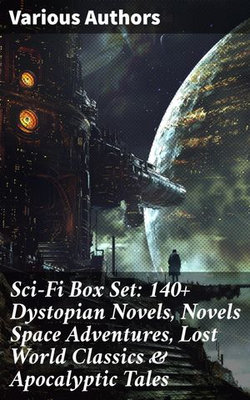
-
Books
-
Education
-
eBooks
-
Audio Books
-
Film & TV
-
Calendars, Diaries & Stationery
-
Giftshop

The 'Sci-Fi Box Set: 140+ Dystopian Novels, Space Adventures, Lost World Classics & Apocalyptic Tales' is an unparalleled compendium that traverses the vast landscape of speculative fiction. From riveting dystopian odysseys to enthralling tales of space exploration, the anthology encapsulates a… more
The 'Sci-Fi Box Set: 140+ Dystopian Novels, Space Adventures, Lost World Classics & Apocalyptic Tales' is an unparalleled compendium that traverses the vast landscape of speculative fiction. From riveting dystopian odysseys to enthralling tales of space exploration, the anthology encapsulates a myriad of literary styles and epochs. The curated works showcase the transformative power of speculative storytelling, each narrative a reflection of the era and society it emerged from. This collection features timeless classics and hidden gems, presenting a mosaic of thought-provoking themes such as human survival, societal collapse, and the eternal quest for knowledge. The anthology assembles an illustrious roster of pioneering authors, each contributing to the development of speculative fiction. With foundational figures like Jules Verne and H.G. Wells alongside innovative voices such as Mary Shelley and Edgar Allan Poe, the collection aligns with pivotal literary and cultural movements. The synergy of these diverse narratives, spanning fantastical explorations to philosophical meditations, offers readers a nuanced understanding of the genre'Äôs evolution. Authors hailing from varied backgrounds present a kaleidoscope of perspectives, enriching the anthology'Äôs exploration of both fantastical and conceivable futures. Dive into this anthology to engage with an expansive dialogue that bridges Victorian imaginations with 20th-century visions. Each story encapsulates unique insights and challenges conventions, offering readers an educational dive into humanity's ceaseless battle against the unknown and the unprecedented. The collection serves as an invaluable resource for enthusiasts of speculative fiction and those seeking to explore the undercurrents of cultural and existential inquiry. This compilation is not just a journey through imaginative worlds but a profound examination of the timeless human condition, making it an essential addition to any literary collection.
lessThis item is delivered digitally
Thanks for reviewing Sci-Fi Box Set: 140+ Dystopian Novels. We will process your review. Accepted reviews will be posted within 3-7 business days.
Be the first to know, stay up to date with what's trending and get staff picks in your inbox with our newsletter


Public: Allow anyone to view or shop your List
Private: No one can view or shop your List
We have kept your A&R details for your new Angus & Robertson account
We also noticed that you have previously shopped at Bookworld. Would you like us to keep your Bookworld order history?
We also noticed that you have an account on Bookworld. Would you like us to keep your Bookworld details, including delivery addresses, order history and citizenship information?
Share This eBook